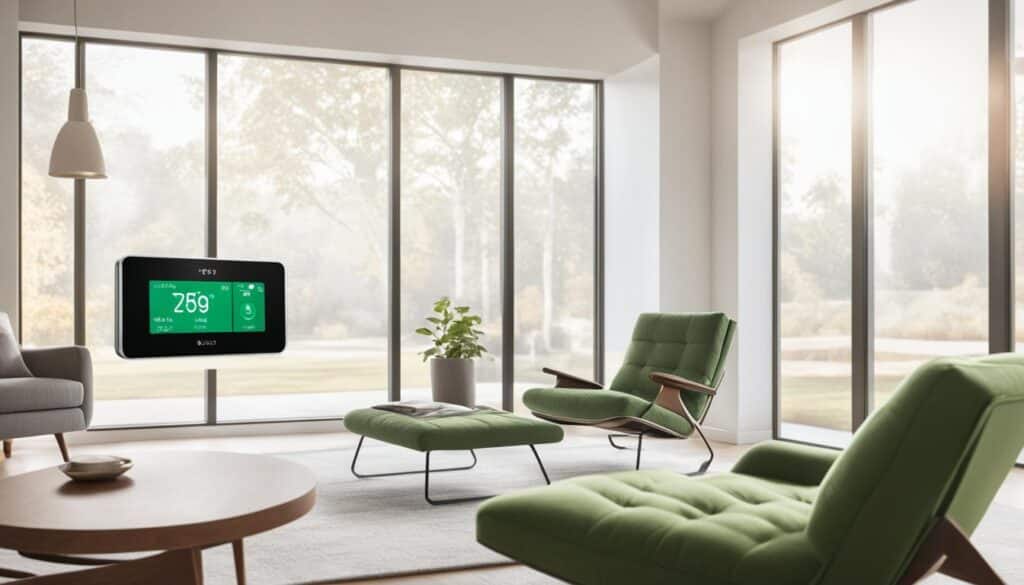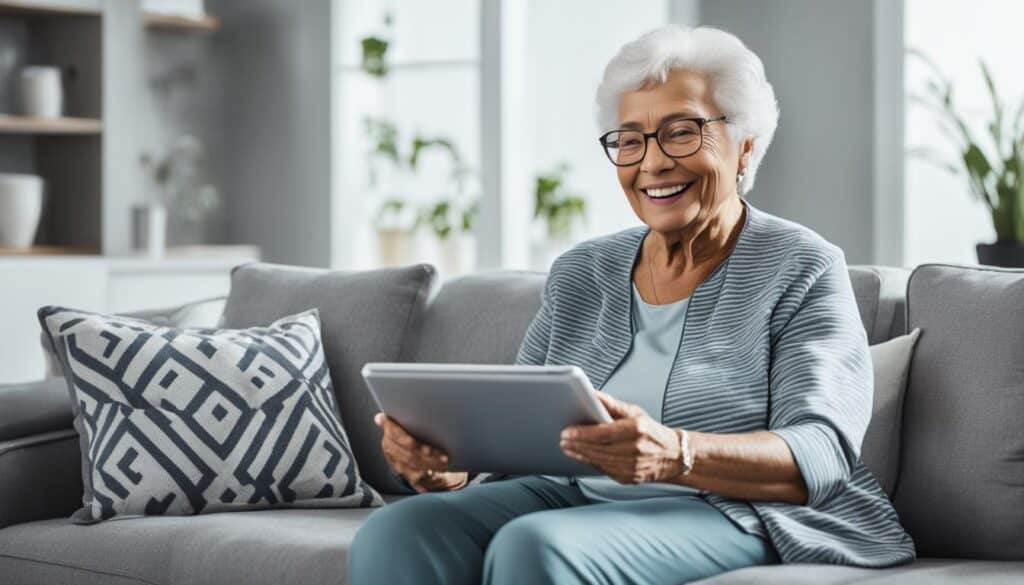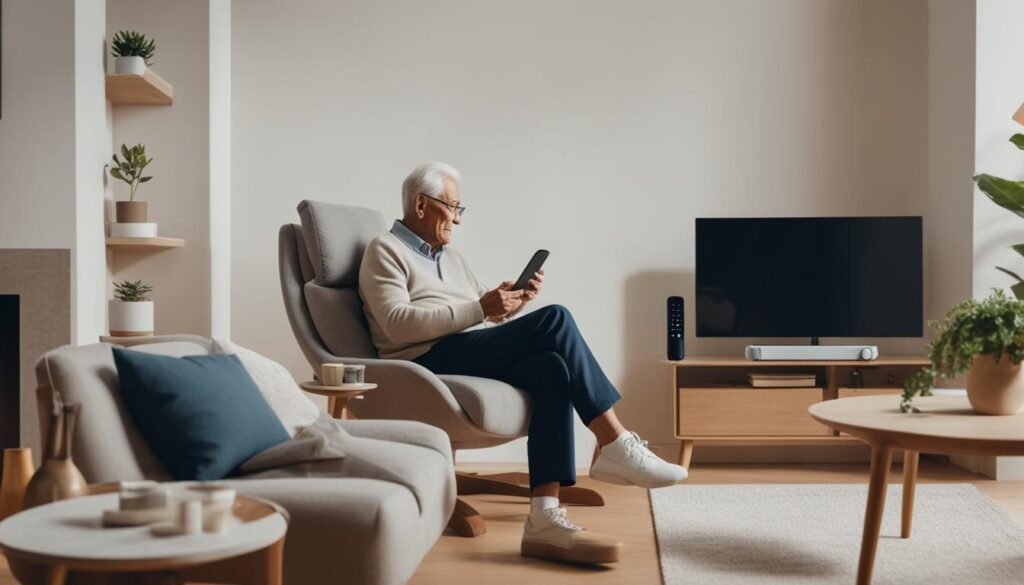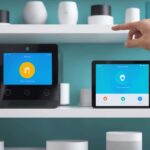Smart home automation has become increasingly popular in recent years, offering a wide range of benefits for people of all ages. For the elderly specifically, smart home technology can greatly enhance their safety, comfort, and overall quality of life. By automating various aspects of their daily routines, seniors can enjoy a more independent and convenient lifestyle within the comfort of their own homes. Let’s explore the essentials of smart home automation for the elderly and how it can positively impact their lives.
Table of Contents
Key Takeaways:
- Smart home automation provides safety and security features to ensure the well-being of elderly individuals living alone.
- Energy efficiency and environmental control systems allow seniors to manage their energy consumption and create a comfortable living environment.
- Health monitoring devices and assisted living features assist the elderly in managing their health and medications.
- Convenience and ease of use are key benefits of smart home automation for the elderly, reducing physical effort and cognitive load.
- By embracing smart home automation essentials, we can enhance the quality of life and promote independence for our elderly loved ones.
Safety and Security Features
One of the primary concerns for the elderly living alone is ensuring their safety and security. Smart home automation provides numerous features that address these concerns.
- Motion sensors: These sensors detect movement within the home and can be programmed to send alerts or trigger other actions when unexpected motion is detected.
- Door/window sensors: By installing sensors on doors and windows, the system can monitor if they are opened or closed, providing an additional layer of security.
- Video surveillance systems: With remote access capabilities, seniors can monitor their homes via video cameras from anywhere, giving them peace of mind and the ability to keep an eye on their surroundings.
- Smart locks and video doorbells: These devices allow the elderly to control access to their homes. They can lock and unlock doors remotely and use video doorbells to see and communicate with visitors before letting them in.
- Integration with emergency alert systems: Smart home automation can be integrated with emergency alert systems, ensuring prompt help in case of medical emergencies or other urgent situations.
- Fall detection devices: Some smart home systems include fall detection devices that can automatically detect falls and send alerts to caregivers or emergency services.
The safety and security features of smart home automation provide the elderly with a sense of protection and control over their living environment. These features greatly contribute to their overall well-being and peace of mind.
Energy Efficiency and Environmental Control
When it comes to smart home automation for the elderly, energy efficiency and environmental control play a crucial role. By automating their lighting, heating, and cooling systems, seniors can effortlessly manage their energy consumption while enjoying a comfortable living environment.
One of the key devices for optimizing energy usage is the smart thermostat. These innovative devices enable temperature control based on occupancy, time of day, or even weather conditions. With the ability to adjust settings remotely, seniors can ensure their homes are always at the perfect temperature without wasting energy unnecessarily.
Lighting automation is another feature that greatly contributes to energy efficiency. Seniors can create schedules for their lights, ensuring they are only on when needed. Motion-based activation ensures that lights are not left on in unoccupied rooms, while remote control allows for effortless adjustment from anywhere in the home.
By incorporating energy-efficient practices into their smart home automation systems, the elderly can not only reduce their carbon footprint but also experience cost savings on their energy bills. The convenience of automated energy management allows seniors to focus on other important aspects of their daily lives while knowing they are contributing to a sustainable future.

Health Monitoring and Assisted Living
Smart home automation technology plays a crucial role in enhancing the health monitoring capabilities of the elderly. By integrating health monitoring devices into the smart home ecosystem, seniors can easily track their vital signs and ensure prompt medical attention if necessary.
Devices such as blood pressure monitors, glucose meters, and weight scales can be seamlessly connected to the smart home system, allowing seniors to monitor their health from the comfort of their own homes. Tracking and recording vital signs regularly not only empowers individuals to take control of their health but also enables healthcare professionals to assess their well-being remotely, making informed decisions about any necessary interventions.
For instance, let’s consider a scenario where an elderly individual with diabetes has a smart blood glucose monitor connected to their smart home system. The monitor automatically records blood sugar levels and transmits the data to the individual’s healthcare provider. This allows healthcare professionals to closely monitor the patient’s condition and provide timely recommendations for managing their diabetes.
“With smart home automation, seniors can access accurate and up-to-date health information, enabling them to make informed decisions about their well-being.”
In addition to health monitoring devices, smart home automation can also assist seniors in managing their medications effectively. Through programmable medication reminders and dispensers, seniors can receive timely alerts and dispensations, reducing the risk of missed doses or accidental medication errors. These reminders can be customized to align with the individual’s specific medication schedule, ensuring proper dosage and timing.
By utilizing smart home automation for health monitoring and assisted living, seniors can lead more independent and confident lives. They can proactively manage their health, receive timely medical attention when needed, and minimize the risks associated with medication management.
| Benefits of Smart Home Automation for Health Monitoring | Table 4.1 |
|---|---|
| 1. Real-time tracking of vital signs | |
| 2. Remote monitoring by healthcare professionals | |
| 3. Timely medication reminders and dispensing | |
| 4. Reduced risk of medication errors | |
| 5. Increased independence and confidence |
By embracing the capabilities of smart home automation, the elderly can maintain a proactive approach to their health while being supported by technology designed with their specific needs in mind. With the help of integrated health monitoring devices and medication management systems, seniors can maintain a higher quality of life and enjoy a greater sense of security.
Convenience and Ease of Use
The convenience and ease of use offered by smart home automation is particularly valuable for the elderly. With simple voice commands, voice assistants like Amazon Alexa or Google Assistant can control various smart devices, eliminating the need for complex interfaces. Seniors can effortlessly command their smart homes, making daily tasks more manageable and hassle-free.
Automated routines are another convenient feature of smart home automation. With a single command or trigger, seniors can have multiple tasks executed simultaneously. For example, turning off lights, locking doors, and adjusting the thermostat can all be done with just one automated routine. This level of automation reduces physical effort and cognitive load, allowing seniors to navigate their homes with ease.

By incorporating smart home automation, elderly individuals can enjoy a new level of convenience and accessibility in their daily lives. From controlling devices with voice commands to creating automated routines, smart home technology makes everyday activities simpler and more efficient.
Conclusion
In conclusion, smart home automation offers a multitude of benefits for the elderly, providing them with a safer, more comfortable, and independent lifestyle. By implementing safety and security systems, energy efficiency controls, health monitoring devices, and convenient automation, seniors can experience an improved quality of life within the familiar surroundings of their own homes.
With smart home technology constantly evolving, the potential for tailored solutions to meet the unique needs and preferences of the elderly population is only going to increase. Advancements in smart home automation will continue to enhance the well-being and happiness of our elderly loved ones by providing even more personalized and effective solutions.
By embracing the essentials of smart home automation, we can empower the elderly to live with confidence and autonomy. Through the integration of these intelligent systems, we can ensure that our senior citizens receive the care, comfort, and convenience they deserve, enhancing their overall quality of life and enabling them to age in place gracefully.
FAQ
What is smart home automation?
Smart home automation refers to the integration of technology and devices within a home to automate and control various functions, such as lighting, security systems, temperature, and more.
How can smart home automation benefit the elderly?
Smart home automation can greatly enhance the safety, comfort, and overall quality of life for the elderly by providing features such as safety and security systems, energy efficiency controls, health monitoring devices, and convenient automation to make daily activities more manageable.
What safety and security features are available with smart home automation for the elderly?
Smart home automation offers features like motion sensors, door/window sensors, video surveillance systems, smart locks, video doorbells, integration with emergency alert systems, and fall detection devices to enhance safety and security for the elderly living alone.
How does smart home automation promote energy efficiency and environmental control for the elderly?
Smart home automation allows seniors to automate lighting, heating, and cooling systems, optimize energy usage with smart thermostats, create schedules for lighting, and control devices remotely. These features help manage energy consumption and create a comfortable living environment.
Can smart home automation assist the elderly in monitoring their health and medications?
Yes, smart home automation can integrate health monitoring devices such as blood pressure monitors, glucose meters, and weight scales, allowing seniors to track their vital signs easily. Smart medication reminders and dispensers can also be programmed to ensure proper dosage and timing of medications.
How does smart home automation provide convenience and ease of use for the elderly?
Smart home automation offers voice assistants like Amazon Alexa or Google Assistant that can control various devices through simple voice commands. Seniors can also create automated routines to handle multiple tasks simultaneously without the need for complex interfaces, reducing physical effort and cognitive load.


